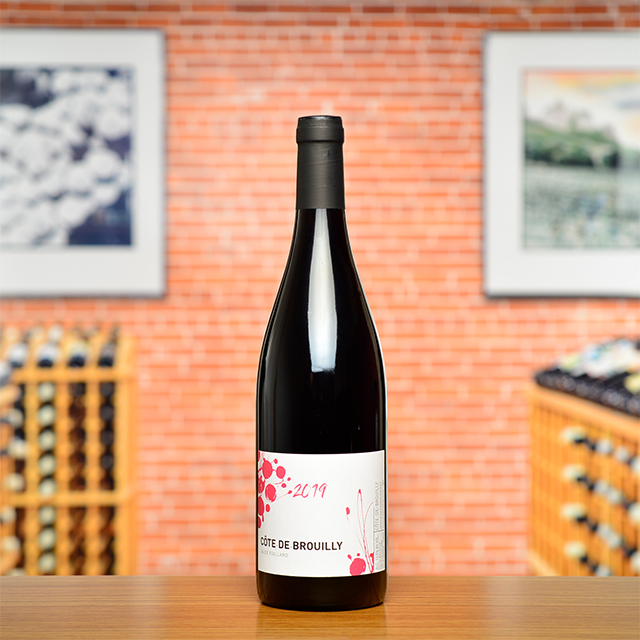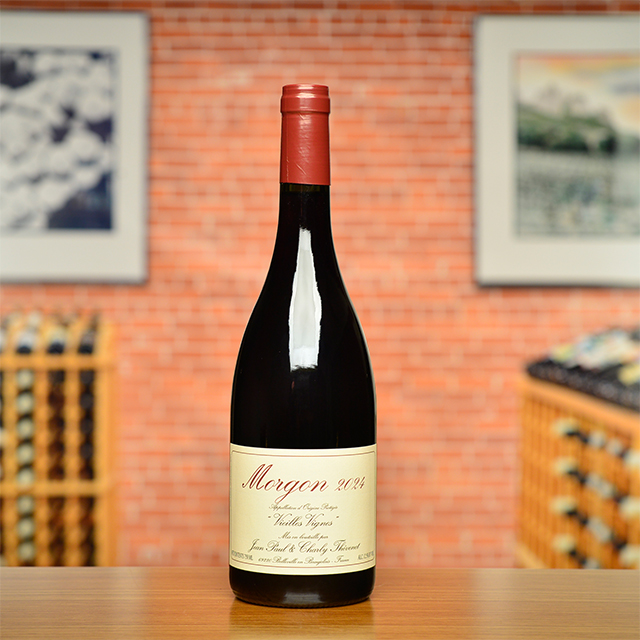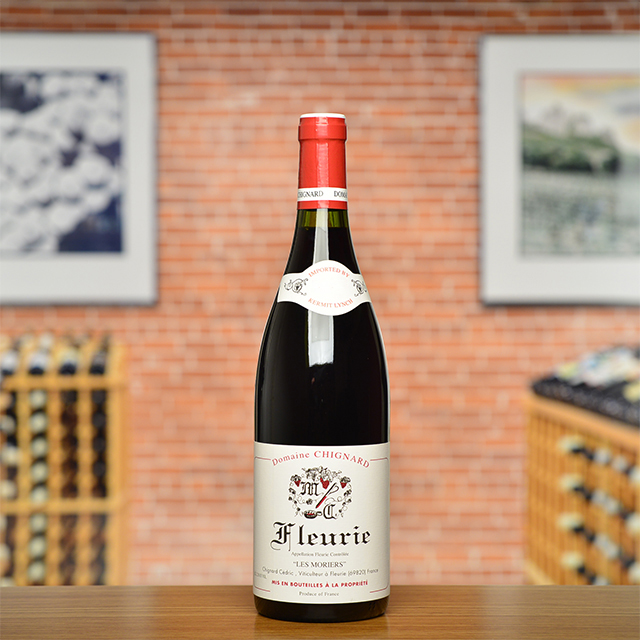Notify me
2019 Côte de Brouilly
Alex Foillard
Working in Brouilly and the Côte de Brouilly, Alex plays with the sometimes mind-bending and rule-defying nature of the special terroirs here.
Almost thirty years ago, Kermit introduced U.S. wine drinkers to four disciples of Jules Chauvet, the Beaujolais vigneron who experimented in making “natural” wines with unparalleled success. One of these followers was Jean Foillard, a soft-spoken perfectionist who has arguably become the Beaujolais’s most talented vigneron working today. He crafts reds that range from silky to succulent from the cru of Morgon’s top sites. Their balance, finesse, and age-worthiness are unrivaled in the region.
Now, Jean’s son Alex is fashioning his own reds from Gamay, and the apple certainly does not fall far from the tree. Alex has already joined the ranks of the region’s most gifted—and well-trained—producers. Where Alex has strayed is in the appellations he has chosen as a starting point. Working in Brouilly and the Côte de Brouilly, which represent Beaujolais’s two southernmost crus, just south of Morgon, Alex plays with the sometimes mind-bending and rule-defying nature of the special terroirs here.
The general rule is that Brouilly is the Côte’s slightly softer, more sensuous sibling. This is perennially true with the two classic bottlings from Château Thivin, for example. With Alex’s parcels, however, that rule is reversed depending on the vintage.
I opened a bottle on Thanksgiving, knowing that its versatility would play well to all of the dishes on the table and it wowed even those in my family who are not generally Gamay fans. If you have not tried this wine, I can’t think of a better time to become acquainted.
—Tom Wolf
| Wine Type: | red |
| Vintage: | 2019 |
| Bottle Size: | 750mL |
| Blend: | Gamay |
| Appellation: | Côte de Brouilly |
| Country: | France |
| Region: | Beaujolais |
| Producer: | Alex Foillard |
| Vineyard: | 30, 60 years, 1 ha |
| Soil: | Schist, granite, light layer of sand |
| Farming: | Organic (practicing) |
| Alcohol: | 13.5% |
More from this Producer or Region

2022 Côte de Brouilly
France | Beaujolais
A relatively new addition to Guy Breton’s Beaujolais lineup, this exuberant Côte de Brouilly is flat-out delicious.

2024 Morgon “Vieilles Vignes”
France | Beaujolais
December Club Rouge ~ If Beaujolais were Burgundy, we might consider Morgon to be Vosne-Romanée, with its haunting perfume and silky texture, the proverbial iron fist in a velvet glove.

2024 Beaujolais-Villages
France | Beaujolais
December Club Gourmand ~ This drinks like a Gamay infusion with lovely hints of potpourri, spice, and fresh grapes.

2024 Morgon
France | Beaujolais
The domaine’s flagship bottling, crafted from vines averaging sixty years old; inviting aromatics, succulent flesh, juicy finish.

2023 Chénas “Les Blémonts”
France | Beaujolais
Structured yet full of energy, with notes of blueberry, spice, and other things nice.

2021 Brouilly
France | Beaujolais
A generous dash of plump, sun-ripened fruit enveloping a granite core.

2021 Côte de Brouilly
France | Beaujolais
Alex Foillard fashions a Côte-de-Brouilly that strikes a deeper register, saturating the senses with tooth-staining fruit.

2024 Fleurie “Les Moriers”
France | Beaujolais
Chignard’s Les Moriers, coming from their old vines in the heart of this parcel, has distinction a-plenty, with a great mouthful of Gamay fruit.

2024 Morgon “La Roche Pilée”
France | Beaujolais
This is textbook Morgon: bright, floral, and spicy, recalling juicy peach and sour cherry.

2018 Brouilly
France | Beaujolais
A generous dash of plump, sun-ripened fruit enveloping a granite core
About The Producer
Alex Foillard
The son of “Gang of Four” producer Jean Foillard, Alex had early exposure to the principles of sustainable farming and low-intervention winemaking. Alex’s involvement in the family business began at a young age, helping his father pick grapes during harvest. After studying agriculture at the Lycée Agricole in Montpellier and earning a degree in viticulture and enology in Beaune, Alex purchased his own vineyards, a hectare each in the crus of Brouilly and Côte-de-Brouilly. He works his vines according to organic principles and uses tried-and-true techniques to craft his wines: whole-cluster fermentation with natural yeasts, no fining or filtration, and no additives save for a minute sulfur dose at bottling. As a result, his cuvées have a seductive aromatic component, a silky texture, and a downright deliciousness that is unmistakably Foillard.
About The Region
Beaujolais

After years of the region’s reputation being co-opted by mass-produced Beaujolais Nouveau and the prevalence of industrial farming, the fortunes of vignerons from the Beaujolais have been on the rise in the past couple of decades. Much of this change is due to Jules Chauvet, a prominent Beaujolais producer who Kermit worked with in the 1980s and arguably the father of the natural wine movement, who advocated not using herbicides or pesticides in vineyards, not chaptalizing, fermenting with ambient yeasts, and vinifying without SO2. Chief among Chauvet’s followers was Marcel Lapierre and his three friends, Jean Foillard, Guy Breton, and Jean-Paul Thévenet—a group of Morgon producers who Kermit dubbed “the Gang of Four.” The espousal of Chauvet’s methods led to a dramatic change in quality of wines from Beaujolais and with that an increased interest and appreciation for the AOC crus, Villages, and regular Beaujolais bottlings.
The crus of Beaujolais are interpreted through the Gamay grape and each illuminate the variety of great terroirs available in the region. Distinguishing itself from the clay and limestone of Burgundy, Beaujolais soils are predominantly decomposed granite, with pockets of blue volcanic rock. The primary vinification method is carbonic maceration, where grapes are not crushed, but instead whole clusters are placed in a tank, thus allowing fermentation to take place inside each grape berry.
Much like the easy-going and friendly nature of many Beaujolais vignerons, the wines too have a lively and easy-drinking spirit. They are versatile at table but make particularly good matches with the local pork sausages and charcuterie. Though often considered a wine that must be drunk young, many of the top crus offer great aging potential.
More from Beaujolais or France
2023 Fleurie
Jean Foillard France | Beaujolais
2021 Côte de Brouilly
Alex Foillard France | Beaujolais
2025 Beaujolais Nouveau
La Sœur Cadette France | Beaujolais
2022 Régnié
Guy Breton France | Beaujolais
2024 Morgon “Vieilles Vignes”
Jean-Paul et Charly Thévenet France | Beaujolais
2024 Côte de Brouilly
Château Thivin France | Beaujolais
2022 Côte de Brouilly
Guy Breton France | Beaujolais
2023 Chénas “Vibrations”
Domaine Thillardon France | Beaujolais
2023 Chénas “Chassignol”
Domaine Thillardon France | Beaujolais
2024 Beaujolais MAGNUM
Domaine Dupeuble France | Beaujolais
2024 Morgon
M. & C. Lapierre France | Beaujolais
2024 Côte-de-Brouilly
Nicole Chanrion France | Beaujolais
2023 Fleurie
Jean Foillard France | Beaujolais
2021 Côte de Brouilly
Alex Foillard France | Beaujolais
2025 Beaujolais Nouveau
La Sœur Cadette France | Beaujolais
2022 Régnié
Guy Breton France | Beaujolais
2024 Morgon “Vieilles Vignes”
Jean-Paul et Charly Thévenet France | Beaujolais
2024 Côte de Brouilly
Château Thivin France | Beaujolais
2022 Côte de Brouilly
Guy Breton France | Beaujolais
2023 Chénas “Vibrations”
Domaine Thillardon France | Beaujolais
2023 Chénas “Chassignol”
Domaine Thillardon France | Beaujolais
2024 Beaujolais MAGNUM
Domaine Dupeuble France | Beaujolais
2024 Morgon
M. & C. Lapierre France | Beaujolais
2024 Côte-de-Brouilly
Nicole Chanrion France | Beaujolais
Kermit once said...

Kermit once said...
You don’t have to be rich to cellar a great wine.




















